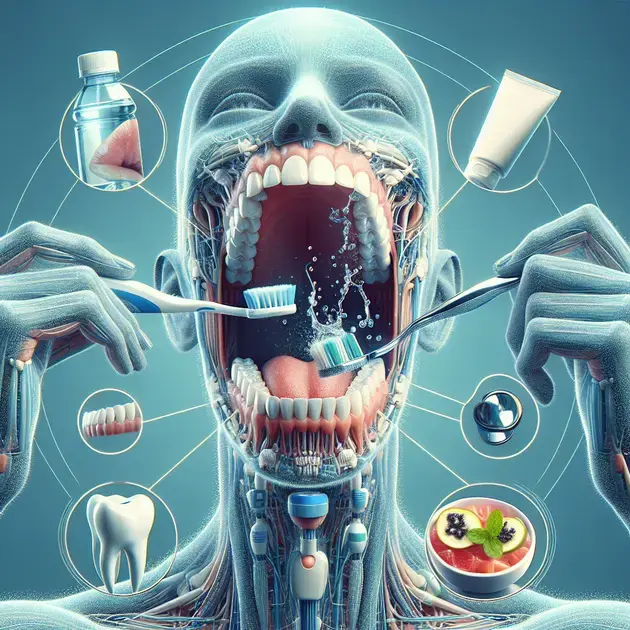Do you ever wonder if those late-night sugar cravings or inconsistent oral hygiene habits are leading you down a path to bad teeth? The good news is that many dental issues are preventable with the right knowledge and practices. With a few simple tips and adjustments to your daily routine, you can take significant steps toward maintaining a healthy and radiant smile for years to come.
In this article, we’ll explore common causes of bad teeth, practical preventive measures, and expert advice to help you stay on top of your dental health game. Let’s dive in and discover how you can proactively protect your teeth from potential problems!

**Ways to Prevent Bad Teeth**
Proper Brushing Techniques
To prevent bad teeth, it is essential to practice proper brushing techniques. Brush your teeth at least twice a day using fluoride toothpaste in gentle, circular motions. Make sure to brush all surfaces of your teeth, including the back molars and along the gumline. A helpful app that can guide you with brushing techniques is “Brush DJ,” which plays music for two minutes to ensure you brush for the recommended duration.
Additionally, consider using an electric toothbrush, as it can provide a more thorough cleaning compared to manual brushing. The Oral-B app offers real-time feedback on your brushing habits, helping you improve your technique and maintain good oral health.
Remember to replace your toothbrush or toothbrush head every three to four months or sooner if the bristles are frayed. This will ensure optimal cleaning and prevent bacteria buildup on the bristles.
By following proper brushing techniques and using helpful apps like Brush DJ and Oral-B, you can effectively prevent bad teeth and maintain a healthy smile.
Regular Dental Check-ups
Another crucial step in preventing bad teeth is to schedule regular dental check-ups with your dentist. Seeing your dentist every six months for a professional cleaning and examination can help detect and address any oral health issues early on.
Look for a reputable dental clinic in your area or consider using online platforms like Zocdoc, which allows you to search for dentists, read patient reviews, and book appointments conveniently. By prioritizing regular dental check-ups, you can receive professional care and advice tailored to your oral health needs.
During your dental visits, discuss any concerns or symptoms you may be experiencing, such as tooth sensitivity or gum inflammation. Your dentist can provide personalized recommendations and treatments to maintain healthy teeth and gums.
By incorporating regular dental check-ups into your oral care routine, you can proactively prevent bad teeth and ensure optimal dental health for years to come.
Healthy Dietary Habits
Your diet plays a significant role in maintaining healthy teeth and preventing dental problems. To avoid bad teeth, limit sugary and acidic foods and beverages that can contribute to tooth decay and erosion. Instead, opt for nutritious foods rich in vitamins and minerals that promote strong teeth and gums.
An excellent resource for healthy eating tips is the MyPlate app, which offers dietary recommendations and meal planning guidance for a balanced and oral-friendly diet. By following dietary guidelines and making informed food choices, you can support your oral health and reduce the risk of dental issues.
Incorporate foods like leafy greens, dairy products, lean proteins, and crunchy fruits and vegetables into your meals to provide essential nutrients for your teeth. Drinking plenty of water throughout the day can also help rinse away food particles and maintain hydration for your mouth.
By adopting healthy dietary habits and leveraging resources like the MyPlate app, you can nourish your body and safeguard your teeth against decay and other oral health issues.

Daily Habits for Strong Teeth
1. Brushing your teeth at least twice a day is a crucial daily habit for maintaining strong teeth. Use fluoride toothpaste and ensure you brush for at least two minutes to effectively remove plaque and prevent issues like bad teeth.
2. Flossing daily is essential to clean between the teeth and along the gum line, where your toothbrush may not reach. Removing food particles and plaque buildup can help prevent cavities, gum disease, and ultimately, bad teeth.
3. Incorporate mouthwash into your daily oral hygiene routine. Mouthwash can help kill bacteria, freshen breath, and protect against tooth decay, ultimately contributing to healthier teeth and preventing issues like bad teeth.
4. Stay hydrated throughout the day by drinking water. Water helps wash away food particles, bacteria, and acids that can harm your teeth and lead to problems like bad teeth. Aim to drink plenty of water daily for optimal oral health.
5. Avoid sugary and acidic foods and beverages that can erode tooth enamel and contribute to tooth decay. Opt for a balanced diet rich in nutrients that support strong teeth and overall dental health, reducing the risk of issues like bad teeth.
Healthy Diet for Better Oral Health
1. Incorporate calcium-rich foods like dairy products, leafy greens, and almonds into your diet to support strong teeth and bones. Calcium is essential for maintaining dental health and preventing problems like bad teeth.
2. Include crunchy fruits and vegetables like apples, carrots, and celery in your diet. These foods can help clean teeth naturally, stimulate saliva production, and neutralize acids that can harm tooth enamel, promoting better oral health and reducing the risk of bad teeth.
3. Limit consumption of sugary and starchy foods that can feed harmful bacteria in the mouth and contribute to tooth decay. Opt for healthier snacks and treats to support dental health and prevent issues like bad teeth.
4. Ensure you’re getting enough vitamin C in your diet to support gum health and reduce inflammation. A balanced diet rich in fruits and vegetables can provide essential nutrients for maintaining healthy gums and preventing conditions that can lead to bad teeth.
5. Avoid excessive caffeine and alcohol consumption, as these beverages can contribute to dehydration and dry mouth, increasing the risk of oral health issues like bad teeth. Stay hydrated with water and make mindful choices for better dental health.
Importance of Regular Dental Check-ups
1. Scheduling regular dental check-ups with your dentist is crucial for maintaining good oral health and catching any issues early on to prevent conditions like bad teeth. Dentists can detect problems, provide professional cleanings, and offer personalized advice for optimal dental care.
2. Regular dental check-ups include comprehensive examinations, professional cleanings, and preventive treatments like fluoride applications or dental sealants. These proactive measures can help protect your teeth from decay, gum disease, and other issues that can lead to bad teeth.
3. Dentists can also provide guidance on proper oral hygiene practices, dietary choices, and lifestyle habits that can impact your dental health. Following their recommendations can help you maintain strong teeth, prevent problems like bad teeth, and enjoy a healthy smile for years to come.
4. Preventive care through regular dental check-ups can save you time, money, and discomfort in the long run by addressing potential oral health issues early and avoiding more extensive treatments down the line. Investing in regular dental visits is key to ensuring your teeth stay healthy and free from problems like bad teeth.
5. Don’t wait for symptoms or pain to arise before seeing your dentist. By attending regular check-ups every six months or as recommended by your dental provider, you can stay proactive about your oral health, address any concerns promptly, and work towards maintaining strong, healthy teeth to avoid issues like bad teeth in the future.
**
Conclusion
**
In summary, maintaining strong and healthy teeth requires a combination of daily habits, dietary choices, and regular dental check-ups. By following proper brushing techniques, incorporating a balanced diet, and scheduling routine visits to the dentist, you can prevent issues like bad teeth and ensure optimal oral health.
Proper brushing techniques, including using fluoride toothpaste, regular flossing, and the use of mouthwash, play a significant role in removing plaque and bacteria, thus preventing cavities and gum disease. Additionally, staying hydrated with water and avoiding sugary or acidic foods can help protect tooth enamel and reduce the risk of bad teeth.
A healthy diet rich in calcium, vitamins, and minerals supports strong teeth and gums, while avoiding harmful foods can prevent decay and maintain oral health. Regular dental check-ups are essential for early detection of any issues, professional cleanings, and personalized guidance on maintaining healthy teeth.
By incorporating these recommendations into your daily routine and seeking professional dental care, you can proactively safeguard your oral health, prevent bad teeth, and enjoy a confident smile for years to come. Remember, taking care of your teeth is an investment in your overall well-being and quality of life. Stay committed to these habits, and your smile will thank you in the long run.
Let your dedication to good oral hygiene shine through, and may your journey towards strong and healthy teeth be filled with bright smiles and lasting wellness.